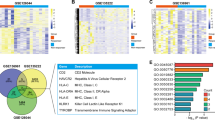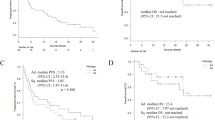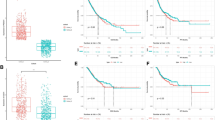Abstract
Background
Despite high expression of PD-L1, around half of advanced non-small cell lung cancer (NSCLC) will not experience tumor response with pembrolizumab. There is an need for a better understanding of the resistance mechanisms in this setting.
Methods
This bi-centric retrospective study included all consecutive patients with PDL1 ≥ 50% advanced NSCLC treated with pembrolizumab in first-line treatment between 2016 and 2020. We compared the clinical characteristics of patients with early progression (refractory) vs others. We performed a comprehensive gene expression profile screening by RNAseq capture on tumor samples.
Results
We included 46 patients. Twenty-two patients were refractory to pembrolizumab, mainly women, with poor performance status and lower albumin concentration. RNAseq analysis was performed on 19 samples. Hierarchical clustering allowed the identification of 3 clusters with various proportion of refractory tumors: intermediate (C1: 57%), high (C2: 71%) and low proportion (C3: 40%). Comparative analysis between C2 and C3 allowed the identification of overexpressed (n = 137) and underexpressed (n = 40) genes. Among the genes of interest, C2 exhibits higher activation of pathways associated with stemness phenotype (Hedgehog, Notch and Hippo pathways) and pathways associated with loss of PTEN and JAK2. In C2, genes associated with PD-1, toll-like receptor-9 (TLR-9), major histocompatibility complex (MHC) and interferon-γ pathways were underexpressed.
Conclusion
This study gives an overview of activated and downregulated pathways in high PD-L1 NSCLC refractory to pembrolizumab. These tumors showed activation of pathways associated with cancer stem cells, loss of PTEN and JAK2, and inhibition of both priming and effector phases of the immune response.




Similar content being viewed by others
Data Availability
The datasets generated during and/or analyzed during the current study are available from the corresponding author on reasonable request.
References
Reck M, Rodríguez-Abreu D, Robinson AG, Hui R, Csőszi T, Fülöp A, Gottfried M, Peled N, Tafreshi A, Cuffe S, O’Brien M, Rao S, Hotta K, Leiby MA, Lubiniecki GM, Shentu Y, Rangwala R, Brahmer JR (2016) Pembrolizumab versus chemotherapy for PD-L1-positive non-small-cell lung cancer. N Engl J Med 375(19):1823–1833. https://doi.org/10.1056/NEJMoa1606774
Champiat S, Dercle L, Ammari S, Massard C, Hollebecque A, Postel-Vinay S, Chaput N, Eggermont A, Marabelle A, Soria JC, Ferté C (2014) Hyperprogressive disease is a new pattern of progression in cancer patients treated by Anti-PD-1/PD-L1. Clin Cancer Res 23(8):1920–1928. https://doi.org/10.1158/1078-0432.CCR-16-1741
Gandhi L, Rodríguez-Abreu D, Gadgeel S, Esteban E, Felip E, De Angelis F, Domine M, Clingan P, Hochmair MJ, Powell SF, Cheng SY, Bischoff HG, Peled N, Grossi F, Jennens RR, Reck M, Hui R, Garon EB, Boyer M, Rubio-Viqueira B, Novello S, Kurata T, Gray JE, Vida J, Wei Z, Yang J, Raftopoulos H, Pietanza MC, Garassino MC (2018) Pembrolizumab plus chemotherapy in metastatic non-small-cell lung cancer. N Engl J Med 378(22):2078–2092. https://doi.org/10.1056/NEJMoa1801005
Paz-Ares L, Luft A, Vicente D, Tafreshi A, Gümüş M, Mazières J, Hermes B, Çay Şenler F, Csőszi T, Fülöp A, Rodríguez-Cid J, Wilson J, Sugawara S, Kato T, Lee KH, Cheng Y, Novello S, Halmos B, Li X, Lubiniecki GM, Piperdi B, Kowalski DM (2018) Pembrolizumab plus chemotherapy for squamous non-small-cell lung cancer. N Engl J Med 379(21):2040–2051. https://doi.org/10.1056/NEJMoa1810865
Dean M, Fojo T, Bates S (2005) Tumour stem cells and drug resistance. Nat Rev Cancer 5:275–284. https://doi.org/10.1038/nrc1590
Maccalli C, Parmiani G, Ferrone S (2017) Immunomodulating and immunoresistance properties of cancer-initiating cells: implications for the clinical success of immunotherapy. Immunol Invest 46:221–238. https://doi.org/10.1080/08820139.2017.1280051
Chen L, Yang QC, Li YC, Yang LL, Liu JF, Li H, Xiao Y, Bu LL, Zhang WF, Sun ZJ (2020) Targeting CMTM6 suppresses stem cell-like properties and enhances antitumor immunity in head and neck squamous cell carcinoma. Cancer Immunol Res 8:179–191. https://doi.org/10.1158/2326-6066.CIR-19-0394
Liao TT, Lin CC, Jiang JK, Yang SH, Teng HW, Yang MH (2020) Harnessing stemness and PD-L1 expression by AT-rich interaction domain-containing protein 3B in colorectal cancer. Theranostics 10:6095–6112. https://doi.org/10.7150/thno.44147
Giroux-Leprieur E, Costantini A, Ding VW, He B (2018) Hedgehog signaling in lung cancer: from oncogenesis to cancer treatment resistance. Int J Mol Sci 19:2835. https://doi.org/10.3390/ijms19092835
Giroux Leprieur E, Vieira T, Antoine M, Rozensztajn N, Rabbe N, Ruppert AM, Lavole A, Cadranel J, Wislez M (2016) Sonic Hedgehog pathway activation is associated with resistance to platinum-based chemotherapy in advanced non-small-cell lung carcinoma. Clin Lung Cancer 17:301–308. https://doi.org/10.1016/j.cllc.2015.12.007
Giroux Leprieur E, Tolani B, Li H, Leguay F, Hoang NT, Acevedo LA, Jin JQ, Tseng HH, Yue D, Kim IJ, Wislez M, Wang C, Jablons DM, He B (2017) Membrane-bound full-length Sonic Hedgehog identifies cancer stem cells in human non-small cell lung cancer. Oncotarget 8:103744–103757. https://doi.org/10.18632/oncotarget.21781.
Pham CD, Flores C, Yang C, Pinheiro EM, Yearley JH, Sayour EJ, Pei Y, Moore C, McLendon RE, Huang J, Sampson JH, Wechsler-Reya R, Mitchell DA (2016) Differential immune microenvironments and response to immune checkpoint blockade among molecular subtypes of murine medulloblastoma. Clin Cancer Res 22:582–595. https://doi.org/10.1158/1078-0432.CCR-15-0713
Mehlman C, Takam Kamga P, Costantini A, Julié C, Dumenil C, Dumoulin J, Ouaknine J, Giraud V, Chinet T, Emile JF, Giroux Leprieur E (2021) Baseline Hedgehog pathway activation and increase of plasma Wnt1 protein are associated with resistance to immune checkpoint inhibitors in advanced non-small-cell lung cancer. Cancers (Basel) 13:1107. https://doi.org/10.3390/cancers13051107
Purow B (2012) Notch inhibition as a promising new approach to cancer therapy. Adv Exp Med Biol 727:305–319. https://doi.org/10.1007/978-1-4614-0899-4_23
Ayaz F, Osborne BA (2014) Non-canonical notch signaling in cancer and immunity. Front Oncol 4:345. https://doi.org/10.3389/fonc.2014.00345
Chung J, Maillard I (2012) Notch signaling in alloreactive T cell immunity. Curr Top Microbiol Immunol 360:135–150. https://doi.org/10.1007/82_2012_226
Li X, Wang Y, Li X, Feng G, Hu S, Bai Y (2021) The impact of NOTCH pathway alteration on tumor microenvironment and clinical survival of immune checkpoint inhibitors in NSCLC. Front Immunol 12:638763. https://doi.org/10.3389/fimmu.2021.638763
Zhang Z, Gu Y, Su X, Bai J, Guan W, Ma J, Luo J, He J, Zhang B, Geng M, Xia X, Guan Y, Shen C, Chen C (2021) Co-occurring alteration of NOTCH and DDR pathways serves as novel predictor to efficacious immunotherapy in NSCLC. Front Oncol 11:659321. https://doi.org/10.3389/fonc.2021.659321
Zhang K, Qi HX, Hu ZM, Chang YN, Shi ZM, Han XH, Han YW, Zhang RX, Zhang Z, Chen T, Hong W (2015) YAP and TAZ take center stage in cancer. Biochemistry 54:6555–6566. https://doi.org/10.1021/acs.biochem.5b01014
Hsu PC, Yang CT, Jablons DM, You L (2018) The role of Yes-Associated Protein (YAP) in Regulating Programmed Death-Ligand 1 (PD-L1) in thoracic cancer. Biomedicines 6:114. https://doi.org/10.3390/biomedicines6040114
Miao J, Hsu PC, Yang YL, Xu Z, Dai Y, Wang Y, Chan G, Huang Z, Hu B, Li H, Jablons DM, You L (2017) YAP regulates PD-L1 expression in human NSCLC cells. Oncotarget 8:114576–114587. https://doi.org/10.18632/oncotarget.23051.
Piro G, Carbone C, Carbognin L, Pilotto S, Ciccarese C, Iacovelli R, Milella M, Bria E, Tortora G (2019) Revising PTEN in the era of immunotherapy: new perspectives for an old story. Cancers (Basel) 11:1525. https://doi.org/10.3390/cancers11101525
Peng W, Chen JQ, Liu C, Malu S, Creasy C, Tetzlaff MT, Xu C, McKenzie JA, Zhang C, Liang X, Williams LJ, Deng W, Chen G, Mbofung R, Lazar AJ, Torres-Cabala CA, Cooper ZA, Chen PL, Tieu TN, Spranger S, Yu X, Bernatchez C, Forget MA, Haymaker C, Amaria R, McQuade JL, Glitza IC, Cascone T, Li HS, Kwong LN, Heffernan TP, Hu J, Bassett RL Jr, Bosenberg MW, Woodman SE, Overwijk WW, Lizée G, Roszik J, Gajewski TF, Wargo JA, Gershenwald JE, Radvanyi L, Davies MA, Hwu P (2016) Loss of PTEN promotes resistance to T cell-mediated immunotherapy. Cancer Discov 6:202–216. https://doi.org/10.1158/2159-8290.CD-15-0283
Kalbasi A, Ribas A (2020) Tumour-intrinsic resistance to immune checkpoint blockade. Nat Rev Immunol 20:25–39. https://doi.org/10.1038/s41577-019-0218-4
Zaretsky JM, Garcia-Diaz A, Shin DS, Escuin-Ordinas H, Hugo W, Hu-Lieskovan S, Torrejon DY, Abril-Rodriguez G, Sandoval S, Barthly L, Saco J, Homet Moreno B, Mezzadra R, Chmielowski B, Ruchalski K, Shintaku IP, Sanchez PJ, Puig-Saus C, Cherry G, Seja E, Kong X, Pang J, Berent-Maoz B, Comin-Anduix B, Graeber TG, Tumeh PC, Schumacher TN, Lo RS, Ribas A (2016) Mutations associated with acquired resistance to PD-1 blockade in melanoma. N Engl J Med 375:819–829. https://doi.org/10.1056/NEJMoa1604958
Gettinger S, Choi J, Hastings K, Truini A, Datar I, Sowell R, Wurtz A, Dong W, Cai G, Melnick MA, Du VY, Schlessinger J, Goldberg SB, Chiang A, Sanmamed MF, Melero I, Agorreta J, Montuenga LM, Lifton R, Ferrone S, Kavathas P, Rimm DL, Kaech SM, Schalper K, Herbst RS, Politi K (2017) Impaired HLA Class I antigen processing and presentation as a mechanism of acquired resistance to immune checkpoint inhibitors in lung cancer. Cancer Discov 7:1420–1435. https://doi.org/10.1158/2159-8290.CD-17-0593
Giroux Leprieur E, Hélias-Rodzewicz Z, Takam Kamga P, Costantini A, Julie C, Corjon A, Dumenil C, Dumoulin J, Giraud V, Labrune S, Garinet S, Chinet T, Emile JF (2020) Sequential ctDNA whole-exome sequencing in advanced lung adenocarcinoma with initial durable tumor response on immune checkpoint inhibitor and late progression. J Immunother Cancer 8:e000527. https://doi.org/10.1136/jitc-2020-000527
Funding
The authors declare that no funds, grants, or other supports were received during the preparation of this manuscript.
Author information
Authors and Affiliations
Contributions
All authors contributed to the study conception and design. Material preparation, data collection and analysis were performed by JT, PTK and EGI. The first draft of the manuscript was written by JT and EGI, and all authors commented on previous versions of the manuscript. All authors read and approved the final manuscript.
Corresponding author
Ethics declarations
Conflict of interest
EGL: MSD (advisory board). Other authors declare no potential conflicts of interest.
Ethics approval
No ethics approval was needed for retrospective studies according to French legislation in force at the beginning of the study. Non-opposition form for retrospective data collection was provided to all patients. None objected to data collection.
Consent to participate
Informed consent was obtained from all individual participants included in the study.
Additional information
Publisher's Note
Springer Nature remains neutral with regard to jurisdictional claims in published maps and institutional affiliations.
Rights and permissions
About this article
Cite this article
Talb, J., Takam Kamga, P., Mayenga, M. et al. Gene expression profile of high PD-L1 non-small cell lung cancers refractory to pembrolizumab. Cancer Immunol Immunother 71, 2791–2799 (2022). https://doi.org/10.1007/s00262-022-03206-4
Received:
Accepted:
Published:
Issue Date:
DOI: https://doi.org/10.1007/s00262-022-03206-4




